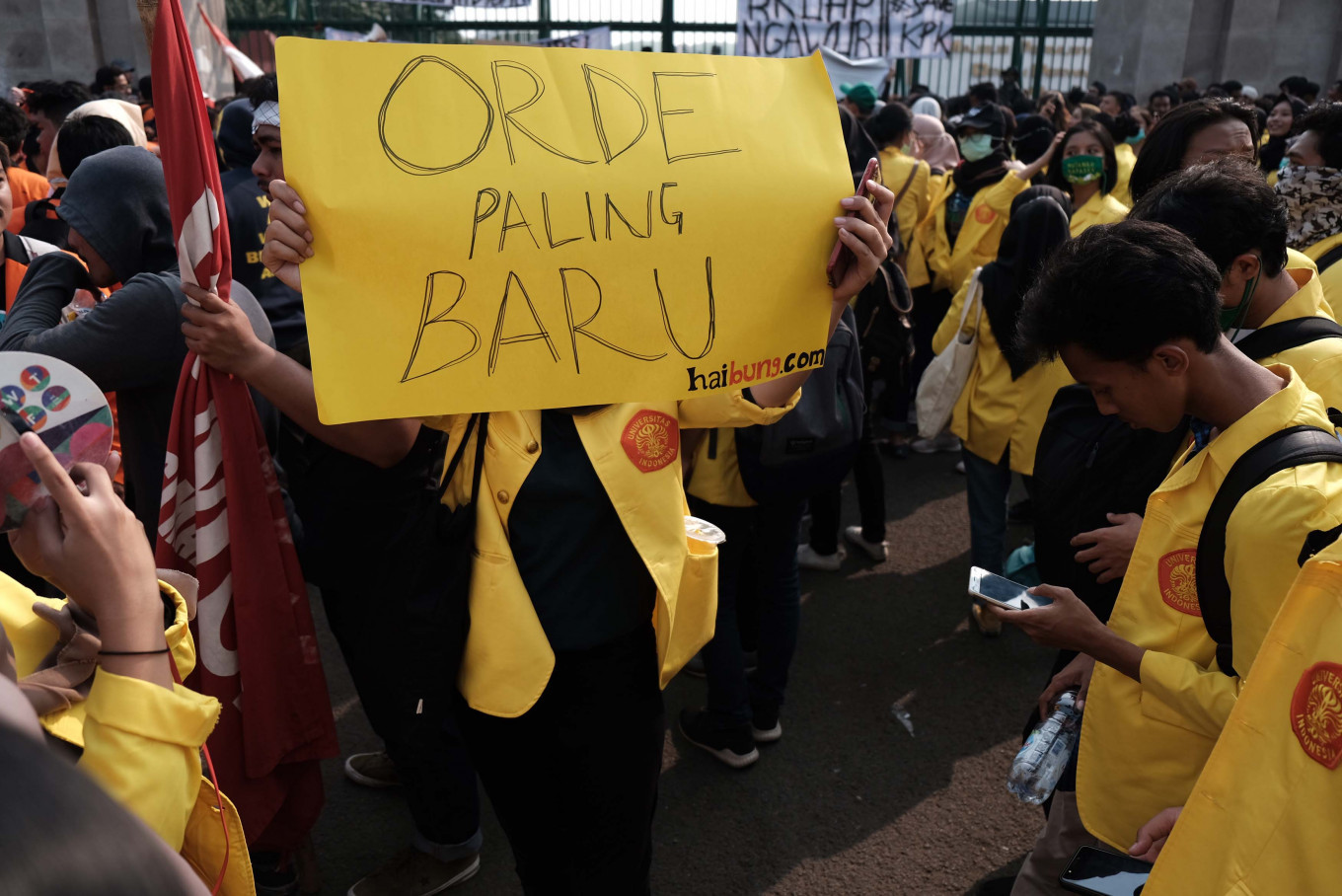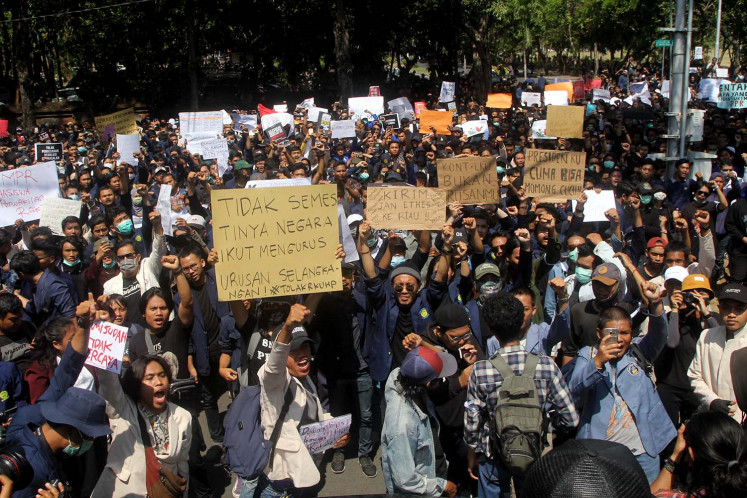Popular Reads
Top Results
Can't find what you're looking for?
View all search resultsPopular Reads
Top Results
Can't find what you're looking for?
View all search resultsFight the power: The argument for resistance
If there is no guarantee that these protests will lead to change, is political protest still worth pursuing?
Change text size
Gift Premium Articles
to Anyone
I
ndonesia is currently erupting with political protests across the nation, with university students from all over the archipelago taking to the streets to fight against various proposed laws that threaten the civil rights of society (such as criticizing the president), as well as further discriminate against minorities, especially women and the Papuan people.
But questions have arisen as to whether protesting is effective. Many argue that formal policy-making, either through Parliament or the Constitutional Court, is the only effective path to change.
So do political protests work?
Political protests have been a tool for freedom of expression for as long as democracies have existed. The Boston Tea Party and the French Revolution, for example, opened the door for political protests, paving the way for movements such as the Suffragettes, the Civil Rights Movement, Gandhi’s Salt March, as well as the Tiananmen Square protests, to name a few. In 2019 alone, we’ve witnessed the Sudanese Revolution, the ongoing protests in Hong Kong against the extradition bill, as well as the global climate strikes.
Political protests are especially apt for overthrowing oppressive leaders, such as the protests against Egyptian leader Hosni Mubarak in 2011, the Serbian Otpor protests to overthrow dictator Slobodan Milosevic in 2000 and, of course, the 1998 protests against Soeharto in Indonesia.
However, when it does not aim to overthrow leaders, as is the case of the ones in Indonesia right now, protests are effective for enacting social change and shifting political stances.
With the wide variety of protests occurring around the world, researchers have had the opportunity to study the efficacy of political protests in different social contexts and political climates. Studies from Harvard University compared two counties in the United States that were nearly identical in average incomes, demographics and voting behavior; with the main difference being that protests were held in one county during the US civil rights movement and the other did not. The study found that white voters in the counties that did have protests were less racist, more likely to support affirmative action policies and more likely to identify with the Democratic Party. These estimations of the study showed that it was unlikely for the changes to happen by chance, and since the demographic characteristics of the counties were nearly similar, the changes were likely the result of the civil rights protests.
Even in the absence of scientific research, the impact of protests on policy changes is apparent. Spearheaded by the actions taken by Rosa Parks, the 381-day Montgomery Bus Boycott effectively ended bus segregation across the US. The Arab Spring protests led to widespread demands for democracy across the Middle East and Northern Africa. The Hong Kong protests pressured the Hong Kong government to formally withdraw the proposed extradition bill.
Despite the vast evidence supporting that mass protests do work, there may be many that stay steadfast in their beliefs that policy-making is the most effective catalyst for change. Their claims may have some credence; policy changes and government reforms often happen due to a combination of factors in addition to protests, ranging from international pressure, economic conditions and overall distrust toward the government.
If there is no guarantee that these protests will lead to change, is political protest still worth pursuing? The answer is yes.
Mass political protests may not always achieve the goals they set out to reach, but two benefits are almost always certain to happen once mass protests have happened: direct political participation and productive discourse. Protesters and their supporters are likely to bring their demands to the voting booth even after the protests have ended, and protests often galvanize citizens who previously may have had no political inclination to become more politically active.
Over 10,000 university students took to the streets in Jakarta, with thousands more holding protests in their cities, including Medan in North Sumatra, Makassar in South Sulawesi, Yogyakarta and more.
Hundreds of students in Bali carry banners during a protest to voice their concerns about various issues, ranging from racism and forest fires to the revision of the Corruption Eradication Commission (KPK) Law on Tuesday. They also protested the Criminal Code revision bill. (JP/Zul Trio Anggono)Discussion is also an immediate benefit of protests. In the past week, hashtags such as #AyoSemuaBergerak (LetsMoveTogether), #HidupMahasiswa (LongLiveStudents) and #GejayanMemanggil (GejayanCalling) have set social media ablaze with constant discussions about various facets of the protests, especially the demands of the protesters and the live reports of the protests' situation (not to mention the various viral protesters' signs).
So, while no guarantee can be made for the success of the protests, there is no doubt that protests are an impetus for change and reform; if not at the governmental level, then certainly on the societal level. It’s baffling that there are those who would still disincentivize protest and question those who choose to stand shoulder-to-shoulder with their fellow citizens, pushing governments to listen to their demands.
But protests that occur sporadically and in isolation are not enough. Change rarely happens overnight, and while it is too early to predict if Indonesia will follow Hong Kong’s footsteps of long, coordinated protests, there is a need to sustain the resistance. After the protesters go home and the rage dies down, as members of society, we should continue to monitor and watch the government, ensuring that it does not abuse its power again.
The government should realize that listening to the people’s demands will not undermine its power; rather, it is more likely to increase society's belief in the current administration and strengthen the legitimacy of the government in the future.
Yet when the government refuses to listen and all other channels have failed, protests are the last viable option for the unheard society. When the youth take to the streets, it is a sign that a government has failed to fulfill its mandate to society.
There has been a long history of protests in Indonesia, but the recent protests may go down in history as the most culturally significant after the 1998 protests. The fire of resistance is alight in Indonesia’s youth and we can only hope that the embers will not snuff out until the government shows its commitment to not only change but also to listening to the people’s voices going forward. (wng)
***
Haikal Satria is an economics student at Gadjah Mada University (UGM) who often writes about the cinema and the arts. You can read more of his thoughts on his Twitter and Instagram accounts, @haikalstr.








